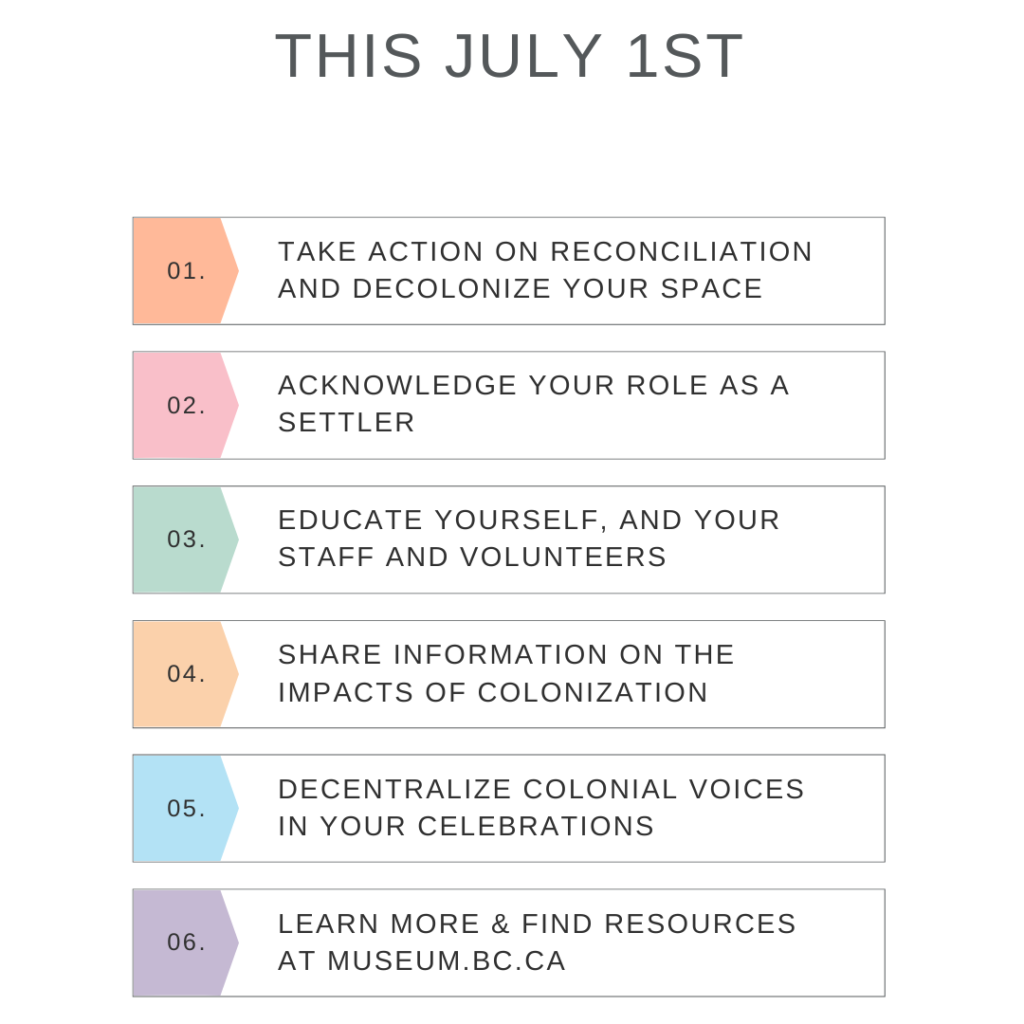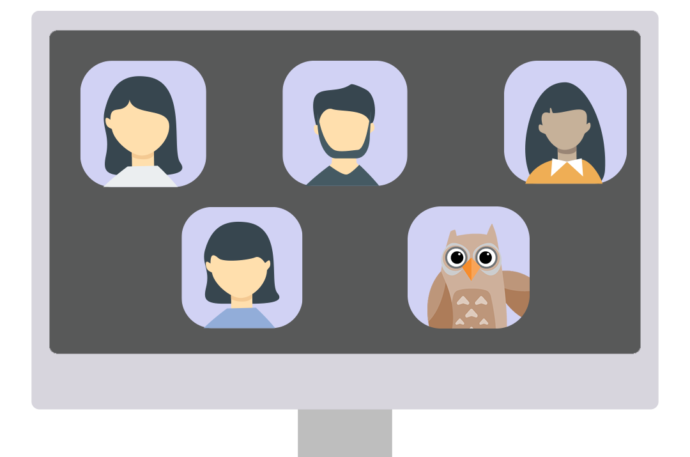How Museums Can Support Reflection, Reconciliation, and Redress on July 1st
Should My Museum Stop Commemorating Canada Day?
What Did Have other Arts and Cultural Institutions Done?
Museums, galleries, and heritage sites are powerful spaces for communities to learn from each other and engage in challenging conversations. What we choose to do in these spaces has an impact. It’s our responsibility to be intentional about this impact and use the power we have to honour the stories and peoples that have been marginalized by celebrations of the past.
According to the Alberta Museums Association’s 2021 report, 84% of Canadians visit a museum at least once in a five-year period. The majority of Canadians visit museums infrequently, with many only visiting during holidays and special events, like Canada Day. For people who work and volunteer in our sector and spend their lives immersed in thinking critically about the past, it can be easy to forget that after leaving school, many Canadians might only reflect on our shared past infrequently. If many Canadians only reflect on the past at museums, and many only visit during special events, how we frame events directly influences how people engage with the past. The activities you plan, the people you highlight, and the imagery you use all tell a story. We encourage our members to reflect on their events and ask themselves, “Whose story are we telling?”
In 2021, in response to the confirmation of unmarked burials at the sites of former residential schools across North America, many local governments, museums, and cultural institutions across the country chose to cancel, significantly alter, or recontextualize their Canada Day events. As time passes, such events mustn’t reflexively slip back into the status quo; we must continue to confront and redress the harms of colonization.

What is #CancelCanadaDay?
In 2021, Idle No More called on all individuals and organizations that wished to challenge colonialism in Canada to take actions that centred Indigenous voices on July 1 and sought to question traditional colonial narratives and patriotic celebrations. They also urged participants to centre Indigenous leadership in #CancelCanadaDay activities and encouraged participants to look for existing Indigenous-led local initiatives to support.
Questioning colonial narratives and seeking to respond to the needs of Indigenous, racialized, and marginalized communities applies not only to Canada Day but to the majority of statutory holidays in Canada as well. If you are interested in decolonial approaches to statutory holidays, we recommend reviewing Animikii’s open-source policy template. This policy allows staff to substitute colonial holidays for days that reflect their personal values and beliefs. Or, if you’re interested in reflecting on how you can diversify the narratives during Remembrance Day, the BCMA published a relevant resource in 2021.
What is the Power of Symbols?
Reflect on and be aware of the types of symbols you use to commemorate holidays. Over the past several years, it has become clear that the Canadian flag holds different meanings for different groups of people. From the flag being used by some in 2021 as a rejection of the #CancelCanadaDay dialogues, to the Canadian flag becoming used as a symbol of far-right anti-vaccine protests in 2022, it is an important time for museums and cultural institutions to reflect on how they engage their communities on Canada Day, being mindful, intentional, and reflexive on the day, its symbols, and its conflicting associations.
The Canadian flag is a symbol that holds different meanings for different people. What can represent freedom for some can represent oppression for others. If you are going to use symbols like the Canadian flag to decorate your site, reflect on the different – and often conflicting – meanings this symbol can have and how its use might exclude participation from certain groups and individuals.
Should My Museum Stop Commemorating Canada Day?
There is no one-size-fits-all answer to this question. Regarding Canada Day programming, much like any museum programming, the BCMA recommends that members reflect on their past practices, consult volunteers and team members, and speak with their communities to create community-informed programming around July 1st. There will be diverging ideas and opinions, and consensus is unlikely, but by engaging your team and community partners, you can create and offer programming that is mindfully designed and speaks to your community’s unique needs and priorities.
To reflect on how arts, culture, and heritage organizations can offer community-responsive programs that engage with national holidays and historic events, consider watching the following June 14, 2023, webinar: Beyond Colonial Holidays: Exploring Community-Responsive Alternatives.
Now is a good time to bookmark this website and add a note to the calendar for the time your organization would typically start planning Canada Day events. Using this resource at that time, you can reflect and adapt future years of planning. This allows you time to have conversations, apply for funding and ensure that you are marking Canada Day in a culturally appropriate and community-minded manner.

BCMA Panel Discussion - Beyond Colonial Holidays: Exploring Community-Responsive Alternatives
Inspired by the #CancelCanadaDay discussions of the past few years, watch a panel of arts, culture, and heritage professionals as we reflect on forms of community engagement that draw the focus away from celebrations of colonial holidays.
What Have Other Arts, Culture, and Heritage Organizations Done in Recent Years?
In 2021 a number of museums, cultural institutions, and local governments chose to postpone or cancel their regular Canada Day activities, including the Museum of History in Ottawa, and the City of Victoria. But, in 2022, there was a noticeable shift back towards the Canada Day status quo, which events in 2023 appear to continue. In preparing examples for this post we observed a noticeable trend back towards a pre-2021 status quo in major events across the country. In 2023 some organizations, like the Museum of History, have discontinued their Canada Day events, while the majority (in our research) have returned to offering Canada Day programs.
Examples from British Columbia:
- In 2025, Burnaby Village Museum will feature a wide range of cultural presentations and performers.
- The City of Victoria chose to postpone their 2021 Canada Day celebrations and to redirect the funding for that event to a community reflection later that summer. The schedule for the city’s 2025 Canada Day event is largely similar to previous years of events.
- The Rossland Museum Canada Day events include a welcome from members of the Autonomous Sinixt community.
- Every year, the historic mill town of Paldi celebrates “100 years of acceptance” with its annual Jor Mela on July 1. This mill town was an early example of multicultural harmony, fostered by the family of the town’s founder, Mayo Singh.
- The Nikkei National Museum and Cultural Centre in Burnaby chooses to focus on dates that honour and celebrate Japanese Canadian heritage. On July 6, they host the Tanabata Market and celebrate the end of the season with Nikkei Matsuri.
Where Can I Turn for Ideas, Education, and Inspiration?
Some ideas for taking action and creating mindful programming around July 1st include:
Bring people together
Bring your staff and volunteers together and discuss what you can do to take action on reconciliation in your community. Discuss which stories you’re currently telling and which ones you’re not telling. Can you develop exhibits or content that specifically explore the damaging effects of colonialism in your community? Can you work with other organizations or groups to magnify your reach? Bring your team together and discuss what an inclusive and diverse Canada at your organization may look like.
Share information with your community
Share information about publicly accessible resources like the 94 Recommendations of the Truth and Reconciliation Commission, UNDRIP, Challenge Racist BC, and the Final Report on Missing and Murdered Indigenous Women and Girls.
This map from the Government of Canada will show you the locations of residential schools. Paths to Reconciliation has also published a map of unmarked graves and burial sites that has been created in collaboration with Survivors and Indigenous communities.
W̱SÁNEĆ Nation has published an article exploring the damage that the reservation system has had on their community. Reading this article can be a way to start thinking about how the reservation system impacts Indigenous peoples and land sovereignty in your region.
Part of addressing racism and colonial violence in Canada comes from acknowledging our roles and the roles of the institutions we work for in systems of oppression. Now is the time to reflect, learn, and take action.
Resources
#Museums Are Not Neutral Keynote
Learn about the work of this global advocacy initiative that is exposing the myth of museum neutrality and explore strategies for making museums relevant, socially engaged community spaces that act as agents of positive change.
BC Museums Week: State of Hate - How Museums Can Identify and Address Hate
Join the BCMA and the Canadian Anti-hate Network for a crucial discussion about the state of hate in Canada. During this webinar, we will focus on recent events such as the COVID pandemic, the Ottawa convoy and the recent BC protests while looking at the intersection of COVID conspiracy movements and hate.
For Museums, a Better Future Means Confronting Past Wrongs
Museums are amongst the most trusted institutions in Canadian society and we’re largely used to seeing ourselves as “the good guys,” helping to preserve the past, educate communities, and facilitate cross-cultural understanding. What museums often fail to realize is that while we’re the hero in our own story, we’re the villain for others.
BCMW2022: Beyond Reconciliation with Mayor Lisa Helps
Lisa Helps, Mayor of the City of Victoria, joins the BC Museums Association for the 2022 BC Museums Week and International Museum Day to talk about the city's reconciliation and decolonization efforts
2022 Conference Session: Truth Telling as a Precursor to Reconciliation
In this session, Ry Moran, Canada’s inaugural Associate University Librarian – Reconciliation at the University of Victoria, will explore the vital importance of truth telling in our collective work of reconciliation, healing and peace making. Central in this talk will be the importance of known and unknown histories in these efforts.
Roundup Issue 281 | Statement by Christopher Derickson, y̓il̓mixʷm Westbank First Nation
Concerning the Unmarked Graves of Indigenous Children Discovered at the Kamloops Residential School in May 2021
Roundup Issue 282 | Fumbling Towards Truth and Reconciliation - Gaining Momentum at the Mayne Island Museum
Hello from the tiny Mayne Island Museum! We are housed in the 1896 Plumper Pass Gaol building in “downtown” Mayne Island, on the unceded territory of Tsartlip First Nation (W̱JOȽEȽP), one of the five communities of the W̱SÁNEĆ Nation. The island is called SḴŦAḴ in SENĆOŦEN, the language of the W̱SÁNEĆ people who have been here and cared for the island for millennia.
